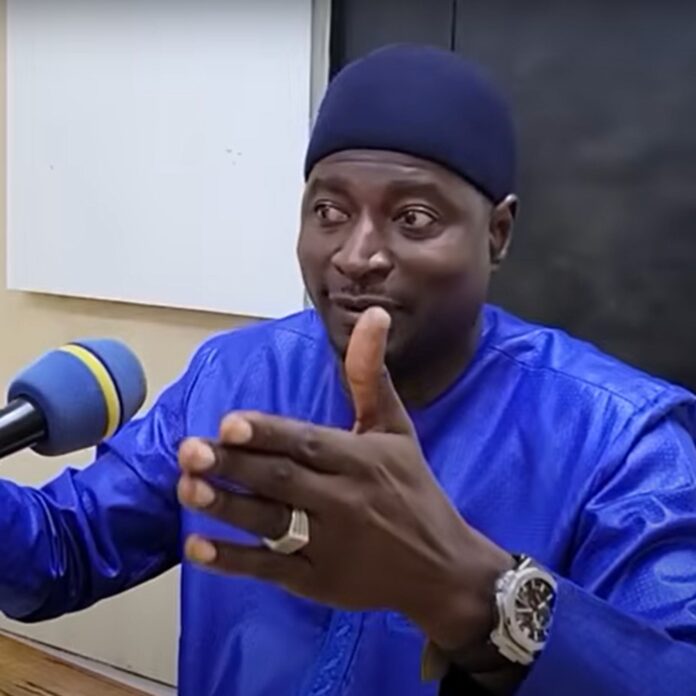By: The Fatu Network Editorial
Deputy Speaker of the National Assembly and Deputy Spokesperson of the National People’s Party (NPP), Seedy S.K. Njie, has defended President Adama Barrow’s administration in a wide-ranging interview on Coffee Time with Peter Gomez, pushing back against opposition criticisms and outlining what he described as the NPP’s priorities ahead of the 2026 election.
Njie, who was first nominated to the National Assembly in 2007 under former President Yahya Jammeh, spoke at length about his political background, his transition from the APRC to the NPP, and his current role in parliament and party leadership. He also addressed questions about tribalism, corruption, diaspora voting, constitutional reform, and allegations of authoritarianism.
According to Njie, his political career began through youth and student activism, where he advocated for scholarships, peace, and student welfare. He noted that he was nominated by President Jammeh after being identified as a promising youth leader. Reflecting on that early period, he said his activism was aimed at preventing a repeat of the April 2000 student protests that ended in deadly violence.
On his controversial role during the 2016–2017 political transition, Njie acknowledged making strong statements in defence of Jammeh but said personal growth and reflection are important. “Whatever happened in the past, the essence of being a positive individual is to reflect,” he said. He added that if harm was caused to anyone, “we unreservedly apologise and move on.”
Njie denied suggestions that President Barrow betrayed the United Democratic Party (UDP) by forming the NPP. He argued that internal tensions within the UDP pushed Barrow away and claimed there was an effort by some party members to sideline the president after the 2016 election. “There was a ploy to get him out and replace him with their party leader,” Njie said.
He maintained that Barrow’s move to seek leadership of the party he emerged from was legitimate, saying, “A member of a political party can at any point in time seek the leadership of his party.” In his view, UDP members should have supported Barrow after his election and allowed him to lead the party as its presidential candidate.
Njie rejected comparisons between the NPP and UDP, claiming the two parties are fundamentally different. He described the NPP as one that promotes social democracy, inclusivity, and infrastructural development, while accusing the UDP of tribal politics and intimidation. These, he argued, are significant ideological differences. “It is false to say UDP and NPP are six and nine,” he said.
Responding to accusations that President Barrow fuels tribalism by hosting ethnic delegations at State House, Njie claimed it was the opposition who had engaged in ethnic mobilisation in the past. He cited, as an example, UDP’s alleged rejection of certain voters from border regions based on origin, describing that behaviour as “tribalist,” though he offered no documentary evidence.
He also rejected allegations of corruption in infrastructure projects, saying such claims are politically motivated and unsupported by evidence. “You cannot just accuse people of corruption without substantiating it,” Njie said. He added that neither the Ministry of Works nor the National Roads Authority had been flagged in audit queries relating to overpricing or mismanagement.
“An audit query is not a conviction,” he said, arguing that due process must be followed in all investigations. Njie accused critics of using social media platforms to spread what he called unverified accusations, while insisting the government remains committed to transparency.
Regarding the 2024 draft constitution, Njie dismissed the notion that it centralises power in the presidency, calling such concerns “ignorant” and “false.” He said there is “not a single provision” in the draft that promotes dictatorship, and claimed that President Barrow has never acted outside the law. He also accused the UDP of being responsible for the failure of the 2020 draft constitution, stating they held a parliamentary majority at the time and chose not to pass it.
On diaspora voting, Njie said the NPP does not oppose it, and pointed out that provisions for it were included in the 2024 draft. He said the current legal challenge lies in the 1997 constitution’s requirement that voters register in a designated constituency. “Even if you are in space, you have to come down to earth and register in a constituency,” he said. He maintained that the government’s intention was to create the legal framework through the draft, which has not yet passed.
Njie also responded to questions about internal unity within the NPP, denying any fragmentation. While acknowledging the departure of figures like Kebba Madi Bojang, the former NPP Youth President who was expelled in mid‑2025, Njie said the party remains intact and continues to attract supporters. “It is our wish that no one leaves,” he said, adding that some who left have since returned.
He defended the NPP’s claim that it aims to win 75% of the vote in 2026, saying it is based on internal polling. “We have done the assessment,” he said, asserting that support for President Barrow remains strong across the country. He dismissed opposing surveys suggesting lower support as “false” and claimed, “The Gambian people believe there is no alternative.”
Addressing public concerns about inflation, unemployment, and cost of living, Njie acknowledged these issues exist but said they are part of global economic trends. He pointed to salary increases, infrastructure development, and support for agriculture as evidence that the government is responding. “No government can say inflation will not happen, but we are doing our best,” he said.
He also highlighted initiatives to empower women and youth, especially through skills development and vocational training. Njie noted the government recognises the need for welders, carpenters, electricians, and technicians alongside professionals like doctors and teachers.
Rejecting opposition claims that Barrow is becoming authoritarian, Njie said the president is “one of the most democratic leaders in the world,” and credited him with expanding infrastructure and respecting civil liberties. “The president can best be described as the mother and father of modern infrastructure in The Gambia,” he said.




